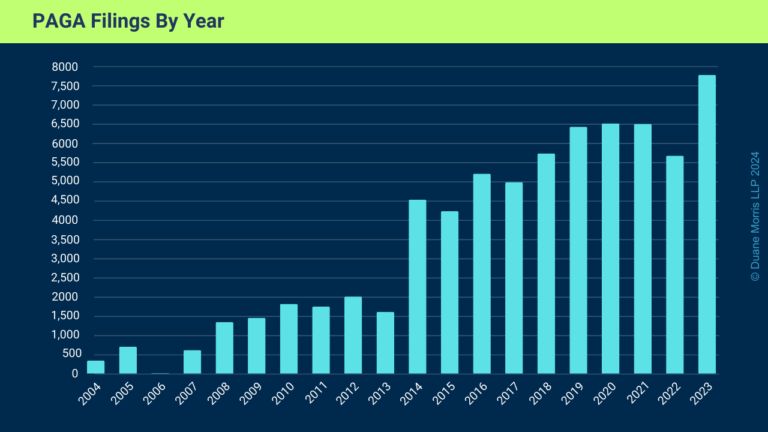- within Litigation and Mediation & Arbitration topic(s)
- with readers working within the Retail & Leisure and Transport industries
- within Law Department Performance, Accounting and Audit and Law Practice Management topic(s)
Duane Morris Takeaway:This week's episode of the Class Action Weekly Wire features Duane Morris partner Jerry Maatman and associate Derrick Fong-Stempel with their analysis of a recent ruling issued by the California Court of Appeal in the Second Appellate District affirming the district court's order declining to grant the defendant's motion to compel arbitration in a PAGA suit.
Check out today's episode and subscribe to our show from your preferred podcast platform: Spotify, Amazon Music, Apple Podcasts, Samsung Podcasts, Podcast Index, Tune In, Listen Notes, iHeartRadio, Deezer, and YouTube.
Learn more about the California PAGA reform bills enacted in 2024 here. Bookmark or download the Duane Morris Private Attorneys General Act Review – 2024 here.
Episode Transcript
Jerry Maatman: Thank you, loyal blog readers and listeners. Welcome to our next episode of our weekly podcast series, the Class Action Weekly Wire. I'm Jerry Maatman, a partner at Duane Morris, and joining me today from Los Angeles is my colleague, Derrick Fong-Stempel. Thanks so much for being here on the podcast.
Derrick Fong-Stempel: Thanks, Jerry, great to be here. Thanks for having me.
Jerry: So, today we wanted to highlight a challenging area in California in general, and what's known as PAGA litigation in particular, and a new ruling by the California Court of Appeal in a case called Arevalo v. Pinnacle Farm Labor Inc. One of the major trends that we've been tracking over the last few years would be the growth of cases brought under the California Labor Code as well as under the PAGA statute. So, Derrick, could you give us a little bit of background about this case, and share with our listeners some of your thoughts as to its significance?

Derrick: Absolutely, Jerry. The plaintiff in this action is a farm worker actually, who filed suit against a farm labor contractor and brought class action claims for labor law violations. Plaintiff separately brought a representative action under PAGA against the defendant Pinnacle Farms. As is customary, plaintiff worked for Pinnacle, but as a laborer was sent to different client farm locations – often several in the same week. One of the clients was Wonderful Citrus Packing. While working at Wonderful's farm, the plaintiff signed an arbitration agreement which provided that any disputes between the parties would be submitted to individual arbitration. Therefore, Pinnacle filed a motion to compel arbitration based on that agreement. Pinnacle also argued that because Wonderful is its client, the arbitration agreement between Wonderful and the plaintiff should extend to its own employment relationship with plaintiff.
The trial court found that the plaintiff entered into an arbitration agreement with Wonderful, and that Pinnacle was, in fact, a third-party beneficiary of the agreement as the labor contractor. However, it also found that the agreement applied only to work performed for Wonderful and at its location specifically. Essentially, then, the trial court found that a portion of the class claims against Pinnacle were outside the scope of the arbitration agreement and denied arbitration of those claims on that specific basis. Pinnacle, of course, appealed the ruling thereafter.
Jerry: I know that Pinnacle had argued on appeal that the trial court erred in concluding that some of the claims were outside the scope of arbitration. And obviously many, many companies have adopted arbitration agreements that cover themselves or their customers in the wake of the U.S. Supreme Court ruling in the Epic Systems case in 2018. How did that issue play out before the California Court of Appeal in this case?
Derrick: That's a great question – thanks, Jerry. Epic is a very significant case in the post-Viking River landscape as well. The Court of Appeal here agreed with the trial court that only Wonderful and the plaintiff specifically were signatories to the agreement, and that the agreement was meant primarily to protect Wonderful. The court specifically stated that it was unreasonable to conclude that the plaintiff, by signing an agreement with Wonderful, actually intended to bind himself to arbitrate any other disputes with other landowners' land. In essence, this was a standard intent-based argument. The Court noted that even if it broadly construed the agreement in favor of arbitration, as Pinnacle argued, it would come to the same conclusion because it would be unreasonable to apply the agreement to the plaintiff's services provided to an entity other than Wonderful.
Jerry: I've been following California-related class action wage and hour developments for going on 42 years, and this is quite an interesting spin by the California Court of Appeal. We may well see this issue percolate up one day to the California Supreme Court. I know for our listeners, obviously 2024 is the year of PAGA reform, and there are many unanswered questions under the new PAGA law in California, and it's certainly going to spike more and more appellate court decisions in this area. Well, thank you, Derrick, for lending your thought leadership and your analysis of this particular case. Thanks so much for appearing on this week's episode.
Derrick: Absolutely thanks. So much for having me, Jerry. It was fun to be on the podcast, and thanks again to all the listeners as well.
Jerry: Thank you.
Disclaimer: This Alert has been prepared and published for informational purposes only and is not offered, nor should be construed, as legal advice. For more information, please see the firm's full disclaimer.


